Address any questions or comments regarding this newsletter to the individual authors listed after each article or to its editors, Nathan Johanning, 618-939-3434, njohann@illinois.edu or Bronwyn Aly 618-695-6060, baly@illinois.edu. The Illinois Fruit and Vegetable News is available on the web at: http://ipm.illinois.edu/ifvn/. To receive or be removed from email notification of new postings of this newsletter, contact Nathan Johanning or Bronwyn Aly at the phone numbers or email addresses above.
In This Issue:
Upcoming Programs (listings for beginning and established growers)
News & Announcements (ISCC Registration, High Tunnel Cucumber Production Guide Available)
Regional Reports (St. Louis metro east, southwestern Illinois (Waterloo), southern Illinois (Murphysboro), Dixon Springs)
Upcoming Programs
See the University of Illinois Extension Local Food Systems and Small Farms Team’s website at:
http://web.extension.illinois.edu/smallfarm/ and the calendar of events at http://web.extension.illinois.edu/units/calendar.cfm?UnitID=629.
- Virtual Melon Variety Trial Update, Monday, November 30, 2020 3:00 – 5:00 p.m. EST. Featuring data on seedless watermelon (both standard-size and personal-size, including grafted variety), cantaloupe, and specialty melon variety evaluation trials conducted at the Southwest Purdue Agricultural Center in Vincennes, IN in 2020. It is free, here is the registration site. https://purdue.ca1.qualtrics.com/jfe/form/SV_5bx2xau3Pb1kQfP After registering, you will receive a confirmation email prior to the meeting with log-in information to join. For more information Contact Wenjing Guan at guan40@purdue.edu or 812-886-0198
- 2021 Illinois Specialty Crops Conference, January 6-8, 2021. Find conference information below in News & Announcements or visit www.specialtygrowers.org/ISCC2021 for more details.
- 2020 Great Lakes Fruit, Vegetable, and Farm Market EXPO, December 8-10, 2020. This year will be a virtual, online event. If you have attended the EXPO in the past, you can expect this pre-conference brochure at the end of October. Online registration will open on November 1, 2020, with plans on having our normal full educational sessions with many trade show vendors. In addition to the pre-conference brochure, you will be able to find updated EXPO information, including a link to registration, at www.glexpo.com
- 2021 Kentucky Fruit and Vegetable Conference Online Every Tuesday in January 2021. For more information visit https://kyhortcouncil.org/2021-ky-fruit-vegetable-conference/
- Tuesday, Jan. 5 – General Session / Protected Ag Technologies
- Tuesday, Jan. 12 – Organic Production / Beginning Vegetable Production
- Tuesday, Jan. 19 – Advanced Fruit Production / Business Management
- Tuesday, Jan. 26 – Advanced Vegetable Production / Beginning Fruit Production
- 2021 Southern Illinois Fruit and Vegetable School, Wednesday, February 10, 2021. This will be a virtual conference that will be combining the Southern Illinois Tree Fruit School, the Southwestern Illinois Tree Fruit School and the Southern Illinois Small Fruit & Vegetable School. Save the date and be on the lookout for further information!
News & Announcements
ISCC Registration
Illinois Specialty Growers Association (ISGA) is thrilled to announce the annual Illinois Specialty Crop Conference (ISCC) will be moving to an interactive, virtual format on January 6-8, 2021! The conference provides a platform for education, information, and networking for Illinois specialty growers during the continuing COVID-19 crisis.

EXCLUSIVE ISGA MEMBER: $15 NON-ISGA MEMBER: $100
Conference pricing was reduced to help ensure these vital educational workshops are easily accessible to members. As a reminder, ISGA membership is open to everyone and anyone joining will have access to the reduced fee. Join ISGA today and save on this year's conference registration.
Registration includes full access to the conference, password-protected access to conference content on our ISGA website following the conference, a virtual swag bag, free magazine subscriptions, goodies, and more!
Conference Highlights:
- An Extensive Educational Library featuring Go-At-Your-Own-Pace Workshops & Tracks
- A Virtual Exhibit Hall
- LIVE Events including Keynote Speakers Sarah Frey
- Technical Assistance for Setting Up E-Commerce and Building Your MarketMaker Profile
- Popcorn Networking Hour provided by COUNTRY Financial
- Farmer Panel on Production, Business Development, and more
- Produce Safety Training & Certification
- Virtual Scavenger Hunt & Leaderboard
Visit www.specialtygrowers.org/ISCC2021 for more conference details.
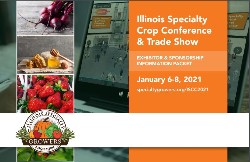
Interested in being an exhibitor or sponsor?
Download the ISCC 2021 Exhibitor & Sponsor Registration packet.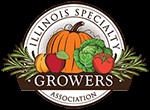
Raghela Scavuzzo
Illinois Specialty Growers Association Executive Director
p: (309)557-2155 m: (309)532-9674
a: 1701 Towanda Avenue Bloomington, IL 61702-2050
w: www.ilfb.org e: rscavuzzo@ilfb.org
Share with your social networks!



High Tunnel Cucumber Production Guide Available
Dear all, I want to let you know we have a new extension publication High Tunnel Cucumber Production Guide published. It is free to download at https://edustore.purdue.edu/item.asp?Item_Number=ID-521-W
We also have hard-copies available. If you want hardcopies, please contact any of the authors. Thanks!
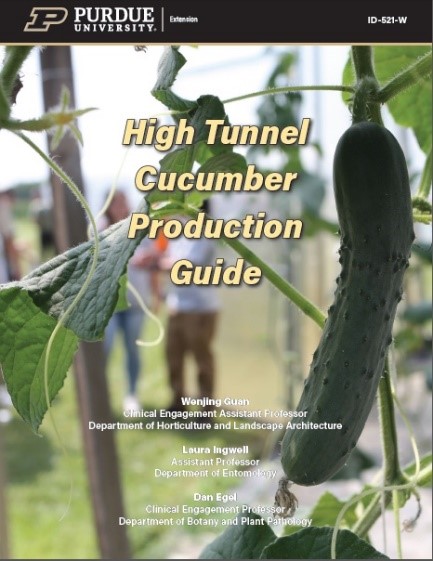
DESCRIPTION
High tunnels, also called hoop houses, are a form of protected agriculture. The plastic-covered structure blocks rain, snow and strong wind that crops are exposed to when growing in the open field. Seedless cucumber is one of the most popular crops grown in high tunnels. The climbing growth habit, parthenocarpic nature of setting fruit without pollination, high yield potential and long harvest window make seedless cucumber an ideal crop for high tunnel production.
PRODUCED
10/26/2020
AUTHOR
Wenjing Guan; Laura Ingwell, Dan Egel
Wenjing Guan
Clinical Engagement Assistant Professor & Horticulture Specialist
Southwest Purdue Agricultural Central
4369 N. Purdue Rd. Vincennes, IN 47591
Phone: 812-886-0198 Email: guan40@purdue.edu
Regional Reports
From the St. Louis Metro east… Like much of the state, the first week of November was unseasonably warm in the St Louis Metro East but has since returned to expected temperature norms. Much of central Illinois, including the northern counties of the St Louis Metro east, are still running abnormally dry even after a couple of significant rain events. No drought is being reported from St Clair County moving east and south.
For all but a small amount of apples left on trees for U-pick, apple harvest for many came to a close the first week of November. Peach leaves dropped relatively early this year, and many growers have already applied a dormant copper spray for control of peach leaf curl. The fungus that causes peach leaf curl overwinters on the tree and infections take place in the spring from bud swell to bud opening under wet conditions. To effectively control peach leaf curl, fungicide must be applied at least once sometime in the window after leaf drop but before bud swell when temperatures are above freezing. The best control is achieved by applying in late autumn at leaf fall, which may also help control bacterial spot.
Light covers are going on plasticulture strawberries for added growth ahead of heavier covers later as temperatures dip. One strawberry grower reported spun row covers are hard to come by, with production evidently switching to personal protective equipment needed for the COVID-19 pandemic.
Registration for ISCC 2021 is now open!
Join us at the Illinois Specialty Crop Conference on Jan 6-8, 2021. The Illinois Specialty Crop Conference (ISCC) is moving to an interactive exhibit hall and virtual conference format! https://www.specialtygrowers.org/
Elizabeth Wahle (618-344-4230; wahle@illinois.edu)
From southwestern Illinois (Waterloo)… Overall it has been what I would call a fairly average November. We have had some rain which has brought our soils out of the severe dry we have had. We had about 3” the last week of October, 1.9” around 11/14 and this past weekend had 2.25” from 11/21-22. This past weekend down at our farm about 15 miles to the south we had 4.5”. Between times we have had a good number of sunny days and most grain crops are out of the field by now. Temperatures have been what I would consider typical to maybe a bit mild. Lows so far haven’t gotten much colder than about 30-32° and highs have been in the 50s with some days a little warmer or colder. I think this is going to change a little later in the week with highs falling and some 20s for nighttime temperatures after Thanksgiving.
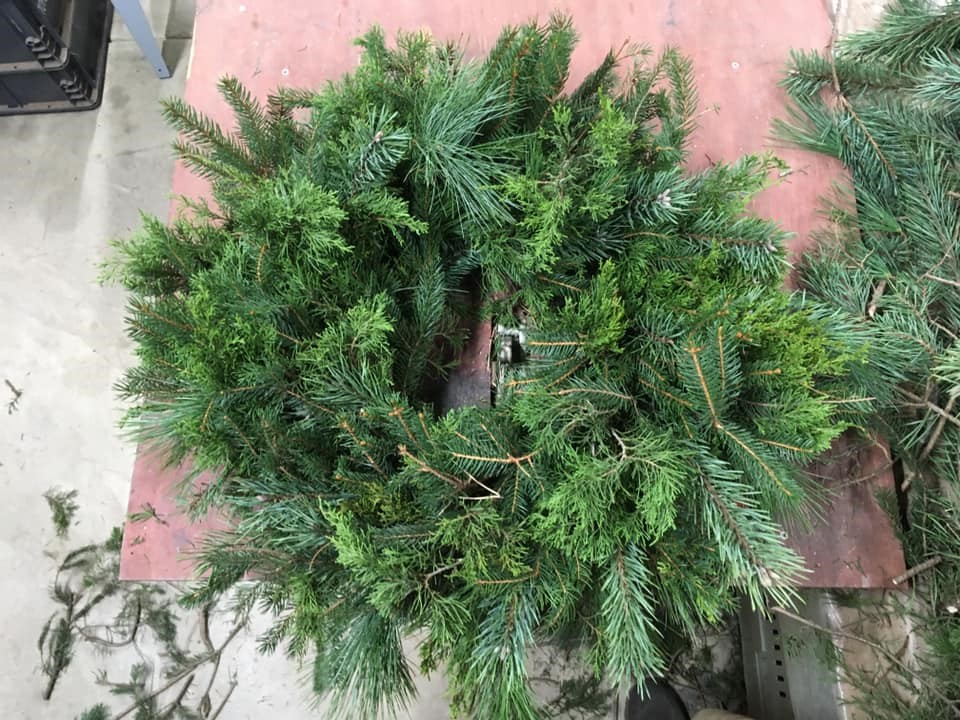
Fresh Christmas wreaths we are making on the farm. Photo: N. Johanning
Not a lot going on out in the field, I’m still harvesting fall broccoli and it has benefited from the moisture and temperatures. With the cooler weather the pests have been limited and quality good. We have cover crops planted for our no-till trials on tomatoes & peppers for 2021 at Urbana and our Waterloo site at the Baebler Educational Farm. The cereal rye was up and looking good. Be watching for more data from the 2020 trials at the winter program and in the newsletter. Around the farm, we are still cleaning up some stray pumpkins and crates and getting things cleaned up for winter. We also have gotten geared up to make a few Christmas wreaths. This was something started by my parents many years ago and we decided to make a few for local retail. If you have the materials and resources, it’s not hard to do, however does take some time.
Hope everyone has a Happy and Safe Thanksgiving!
Nathan Johanning (618-939-3434; njohann@illinois.edu)
From southern Illinois (Murphysboro)… Happy fall and Happy Thanksgiving from Southern Illinois! Here at the Jackson county office, we still have a few things going in the high tunnel. Many of the cool season crops that were planted in September have been or are ready to harvest. Most of the radishes were harvested in late October, except for the winter radishes. The romaine lettuce heads are ready for harvest, and the kale and swiss chard have already been harvested a few times. Beets that were also planted in September have been harvested several times for the greens, and the remaining beets will be harvested later this week.
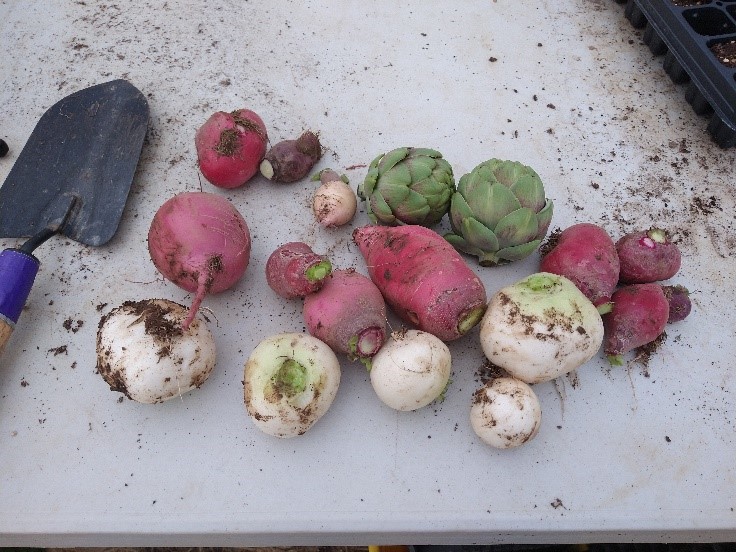
Fall harvest of various radishes from the high tunnel at the Jackson County Extension Office. Photo by K. Bell.
Carrots were harvested last week. Carrots were planted in tilled and no-tilled portions of raised beds in the high tunnel. This was not done as part of an official trial and was not replicated; any of the results are based on visual observations. As you would expect carrots planted in the untilled soil were lower quality than the carrots planted in loose well worked soil. The no-till carrots were difficult to harvest, curved, and split. Carrots in the tilled soil were much easier to harvest, straighter, and displayed variety characteristics better. One of the varieties I planted was a Persian variety, which are typically small round carrots. The Persian type planted in the no-till were noticeably different than those planted in the tilled soil. The carrots were planted in a single bed in the Jackson County high tunnel and other factors may have contributed to the characteristic of the harvested carrots.
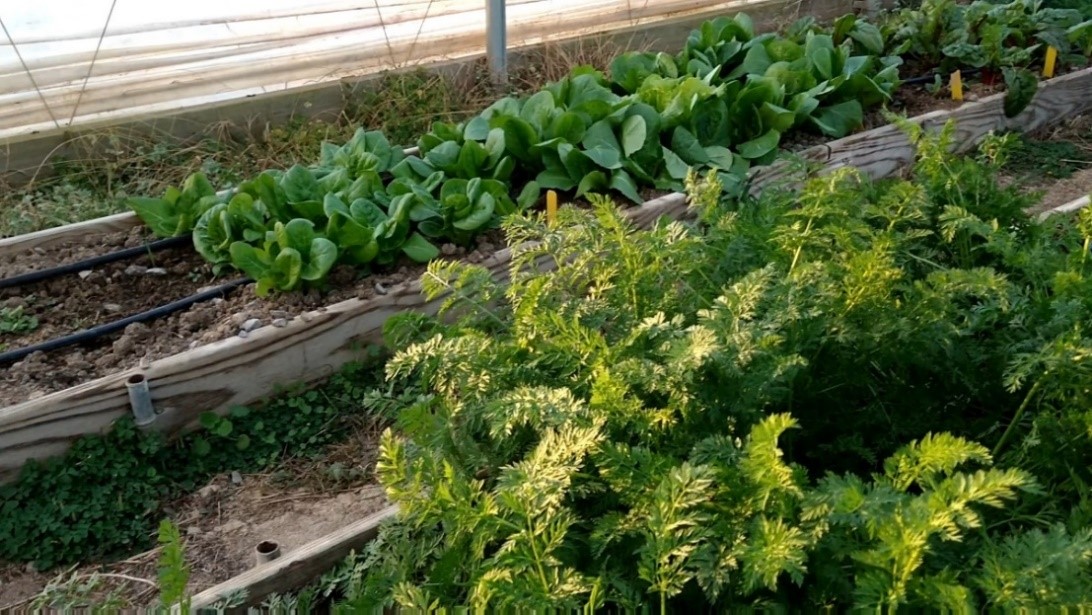
Greens and carrots being grown in high tunnel at the Jackson County Extension Office. Photo by K. Bell,
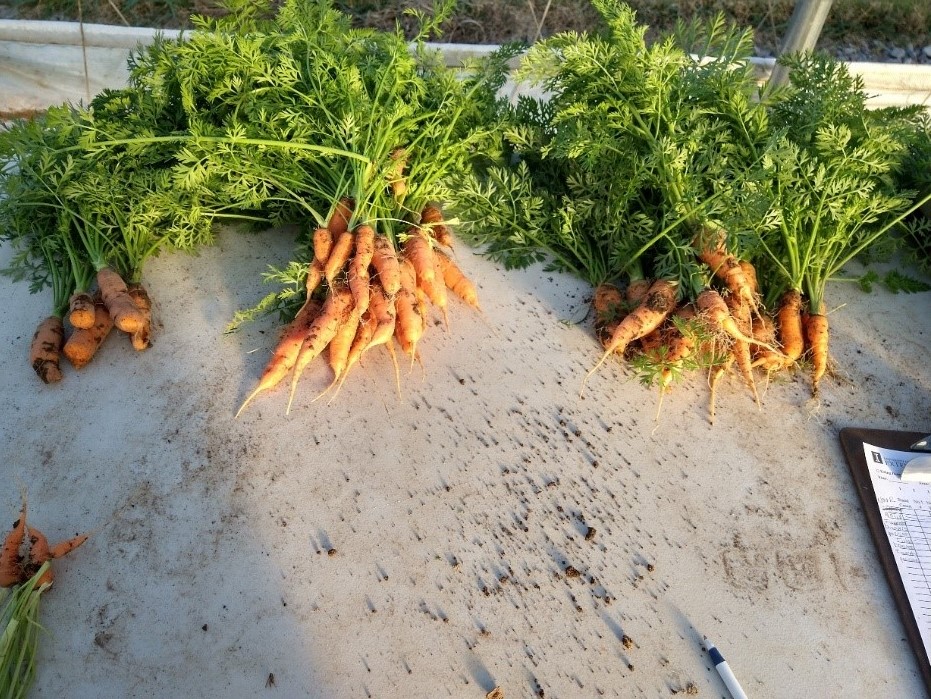
Different carrot varieties and planting systems display variable characteristics within the carrots grown in high tunnel at Jackson County Extension Office. Photo by K. Bell.
Katie Bell (618-687-1727; klbell@illinois.edu)
From Dixon Springs Ag Center…The last few weeks have been pretty pleasant in regards to temperature and sunshine, with just a few chilly nights so far. With all of the tomatoes, peppers, cucumbers, and cut flowers removed from both the hydroponic and in ground tunnels, we now have time to work on a few maintenance issues with the high tunnels.
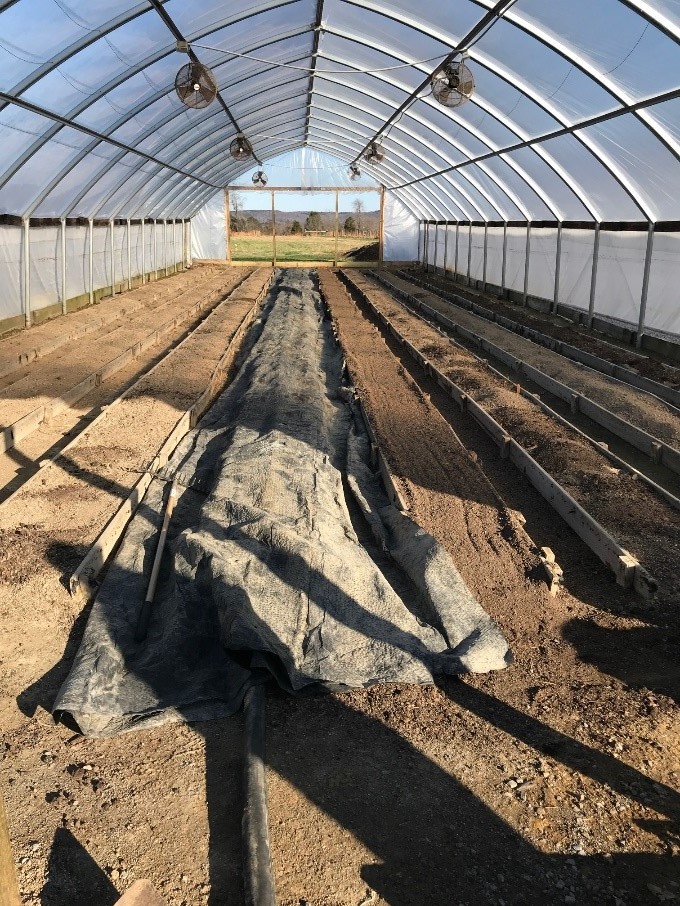
The span of the roll up doors (20 foot opening) on the endwalls of the in ground high tunnel proved to be problematic. The roll up door on the north end, which receives quite a bit of wind, became twisted and would not stay in its track, making tunnel closure in early spring quite challenging. 4” x 4” posts have been installed in the openings of each endwall and spaced far enough apart to still access tunnel with a tractor if needed but close enough to better distribute pressure on the plastic from wind events. We are basically installing three sections or panels of plastic using wiggle wire channel and baseboards in the 20 foot openings. This will allow us to open the ends up during the warmer spring, summer, and fall months and improve air flow and temperature regulation and attach deer netting as needed but also button the tunnel up for the colder winter months. In the picture to the left, the two 4” x4” can be seen in the endwall opening at the far end of the tunnel.
Preparing beds for mushroom production at DSAC. Soil in the beds was removed and replaced with aged horse manure compost, then steam pastuerized to clean up possible weed seeds and disease pathogens. Once pastuerization is complete, mushroom spawn will be added and the beds tarped with black plastic to keep out light. The cooler temperatures predicted for the next week to ten days is perfect to initial the spawn to run. If all goes well, we hope to have mushrooms in time for Christmas dinner. Photo by B. Aly.
Another maintenance issue we will be addressing over the winter, is reworking the hydroponic irrigation system. All of the header lines need to be flushed well and checked for any clogs due to salt build up or other foreign objects. Also, the sylenoid valves and fittings for each of the zones we have established in the hydroponic tunnel have quite a bit of salt build up as well and need to be cleaned and possibly replaced if found to not be functioning at full capacity.
In regards to the IDOA Specialty Crop Block Grant Utilizing High Tunnels to Maximize Winter Vegetable Production, the third planting of lettuce, kale, and spinach was set out the first week of November and the first harvests from the second planting were taken the second week of November. The fourth plantings of carrots have germinated but the fifth planting still has yet to germinate. The sixth direct seeded carrot planting was put out the first week of November. Lettuce from the second planting is nearly ready to harvest and will probably be incorporated into Thanksgiving meals at the end of next week. Row covers have not been needed yet this year, as
temperatures have not been below 25 degrees F, the set temperature in the research protocol that triggers covering of certain plots. This time last year, plots had been covered two different times.
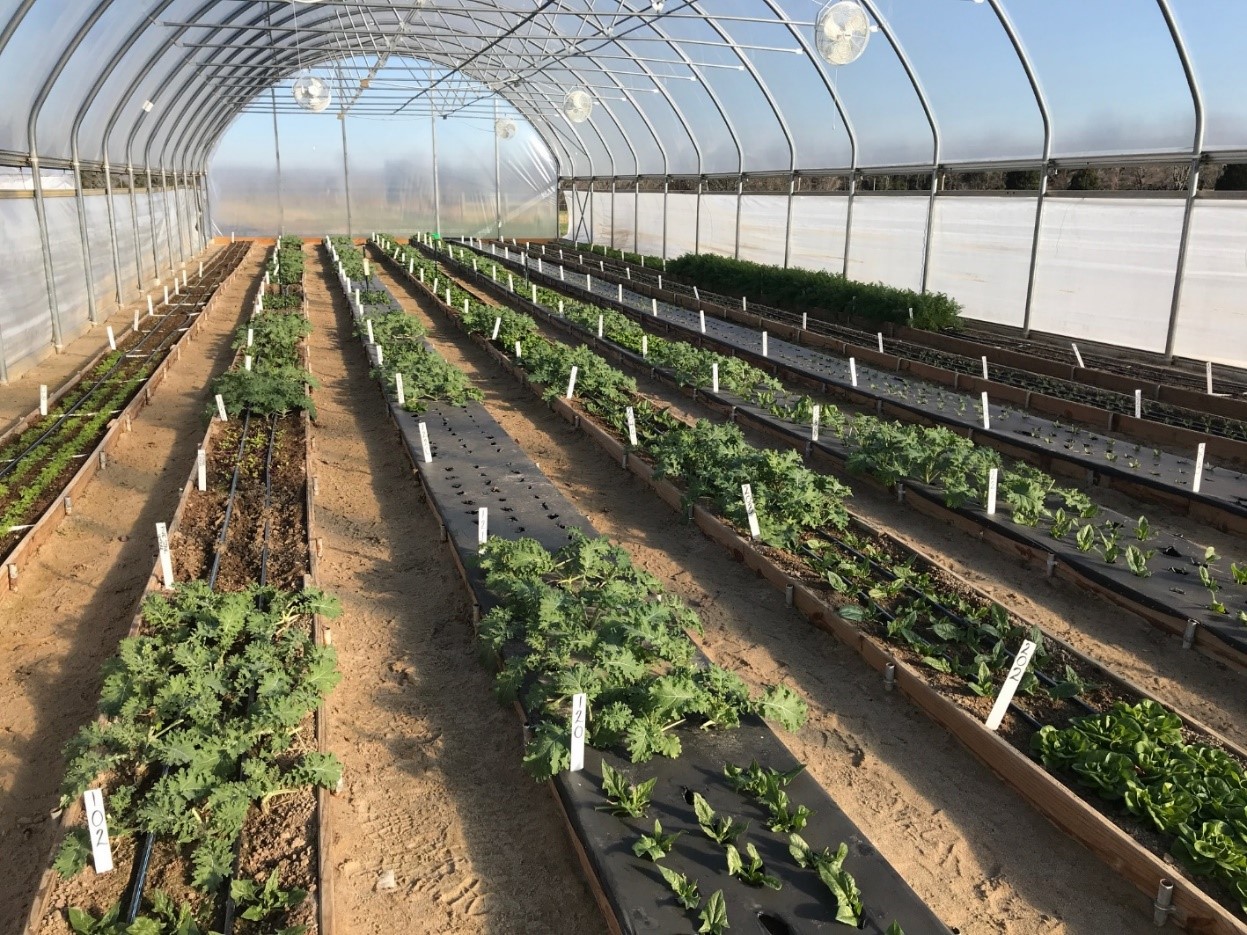
Research plots of lettuce, kale, spinach and carrots at DSAC. Photo by B. Aly.
Bronwyn Aly (618-382-2662; baly@illinois.edu)
Less Seriously
I don’t know where this list originated but I saw it as a shared post from a Facebook friend and got a few laughs from it and thought it was worth sharing. As we approach the Thanksgiving holiday, we may reflect on all the things in our lives that we are thankful for, family, health, job we enjoy, ability to help others, etc. Given all the challenges of 2020, one thing that I am thankful for is still having a sense of humor. Happy Thanksgiving!
1. When one door closes and another door opens, you are probably in prison.
2. To me, "drink responsibly" means don't spill it.
3. Age 60 might be the new 40, but 9:00 pm is the new midnight.
4. It's the start of a brand new day, and I'm off like a herd of turtles.
5. The older I get, the earlier it gets late.
6. When I say, "The other day," I could be referring to any time between yesterday and 15 years ago.
7. I remember being able to get up without making sound effects.
8. I had my patience tested. I'm negative.
9. Remember, if you lose a sock in the dryer, it comes back as a Tupperware lid that doesn't fit any of your containers.
10. If you're sitting in public and a stranger takes the seat next to you, just stare straight ahead and say, "Did you bring the money?"
11. When you ask me what I am doing today, and I say "nothing," it does not mean I am free. It means I am doing nothing.
12. I finally got eight hours of sleep. It took me three days, but whatever.
13. I run like the winded.
14. I hate when a couple argues in public, and I missed the beginning and don't know whose side I'm on.
15. When someone asks what I did over the weekend, I squint and ask, "Why, what did you hear?"
16. When you do squats, are your knees supposed to sound like a goat chewing on an aluminum can stuffed with celery?
17. I don't mean to interrupt people. I just randomly remember things and get really excited.
18. When I ask for directions, please don't use words like "east."
19. Don't bother walking a mile in my shoes. That would be boring. Spend 30 seconds in my head. That'll freak you right out.
20. Sometimes, someone unexpected comes into your life out of nowhere, makes your heart race, and changes you forever. We call those people cops.
21. My luck is like a bald guy who just won a comb.
Which one is YOUR favorite?
University of Illinois Extension Specialists in Fruit and Vegetable Production & Pest Management
Extension Educators – Local Food Systems and Small Farms |
||
Bronwyn Aly, Gallatin, Hamilton, Hardin, Pope, Saline, and White counties |
618-382-2662 |
|
Katie Bell, Franklin, Jackson, Perry, Randolph, & Williamson counties |
618-687-1727 |
|
Sarah Farley, Lake & McHenry counties |
847-223-8627 |
|
Nick Frillman, Woodford, Livingston, & McLean counties |
309-663-8306 |
|
Laurie George, Bond, Clinton, Jefferson, Marion, & Washington counties |
618-548-1446 |
|
Zachary Grant, Cook County | 708-679-6889 | |
Doug Gucker, DeWitt, Macon, and Piatt counties |
217-877-6042 |
|
Erin Harper, Champaign, Ford, Iroquois, and Vermillion counties |
217-333-7672 |
|
Grace Margherio, Jackie Joyner-Kersee Center, St. Clair County |
217-244-3547 |
|
Grant McCarty, Jo Daviess, Stephenson, and Winnebago counties |
815-235-4125 |
|
Katie Parker, Adams, Brown, Hancock, Pike and Schuyler counties |
217-223-8380 |
|
Kathryn Pereira, Cook County |
773-233-2900 |
|
James Theuri, Grundy, Kankakee, and Will counties |
815-933-8337 |
|
Extension Educators – Horticulture |
||
Chris Enroth, Henderson, Knox, McDonough, and Warren counties |
309-837-3939 |
|
Richard Hentschel, DuPage, Kane, and Kendall counties |
630-584-6166 |
|
Andrew Holsinger, Christian, Jersey, Macoupin, & Montgomery counties |
217-532-3941 |
|
Extension Educators - Commercial Agriculture |
||
Elizabeth Wahle, Fruit & Vegetable Production |
618-344-4230 |
|
Nathan Johanning, Madison, Monroe & St. Clair counties |
618-939-3434 |
|
Campus-based Extension Specialists |
||
Kacie Athey, Entomology |
217-244-9916 |
|
Mohammad Babadoost, Plant Pathology |
217-333-1523 |
|